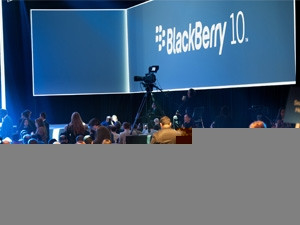
BlackBerry is going on the offensive in the local market in a bid to usurp Android from becoming the most popular selling operating system. Yet, it faces an uphill perception battle, after last year's shake-up and persistent qualms over the pricing of its devices.
The embattled device maker, which is trimming its revenue reliance on handsets and diversifying its offerings, has slowly been seeing its sales eroded. In the fourth quarter of its last financial year - the latest available figures - it sold around 1.3 million units globally, compared to 1.9 million in the third quarter.
Locally, any early advantage it had will soon be eroded by Android. World Wide Worx's April report - the State of the Digital Nation - notes of the 16.3 million smartphones in the market last year, BlackBerry had 5.7 million, followed by Symbian as an OS at 4.1 million and Android at 3.9 million.
However, by 2015, Android's lead will have extended rapidly, to 12 million of the 22.4 million expected users, followed by BlackBerry with a mere 3.6 million. Ovum's research indicates the Canadian company already lost pole position last year.
'No reason'
BlackBerry does not provide country-specific market share figures, but Francois Mahieu, VP of global product management, says it is currently in the top three in SA, and wants to take the top slot by going back to the fundamentals. He says there is "no reason" it cannot be the most popular selling handset in SA as it regroups around its strengths.
However, Ovum analyst Richard Hurst notes the company will face an uphill battle, especially in emerging markets where price is a key factor. Mahieu says BlackBerry has made strong price moves in SA recently, including dropping the cost of its Z10 from around R5 000 to about R2 500. He concedes the range was overpriced, which affected its adoption in the market.
Hurst says while on paper there is no reason BlackBerry cannot be a leader, it faces the challenge of user perception, brought on by last year's uncertainty over whether it would be sold or closed down.
Vital ingredient
Hurst says the app ecosystem will be key for BlackBerry, given the amount of available apps in Google's Play Store. Mahieu says BlackBerry learnt from the launch of BlackBerry 10, which did not initially have a full app suite. He says the devices now have an 85% to 90% compatibility with Android apps based on Jelly Bean.
BlackBerry must recover its device sales, says Mahieu, and is focusing on several technical areas in a bid to do so. He explains the company is targeting professional users, which he defines as "somebody who wants to get the job done, regardless of what the job is".
BlackBerry has also started to correct its design focus, says Mahieu. He explains that five years ago, the company was not focused on aspects such as the screen and memory, but rather the keyboard, privacy and security.
The company also previously tried to keep too much under its control, including manufacturing of components, says Mahieu. CEO John Chen, who joined the company in November, is changing this and in December the group partnered with Foxconn, which led to the Z3 being produced in record time, says Mahieu. "Clearly, we needed help."
Mahieu says its South African offerings will punt keyboards - physical or touch - and has been focused on innovative input devices, and more keyboard products are in the offing. He says BlackBerry is also focused on making the communication experience "great" so that phones have a better battery life, improved call quality and can connect even when signal quality is poor. "For us, these things really matter."
BlackBerry is also working on improving messaging around handset durability, which Mahieu says is already top notch, so that the handsets can stand out. He points out there is a large reseller market in Africa, which the company can benefit from through its BlackBerry Internet Service offering.
Share